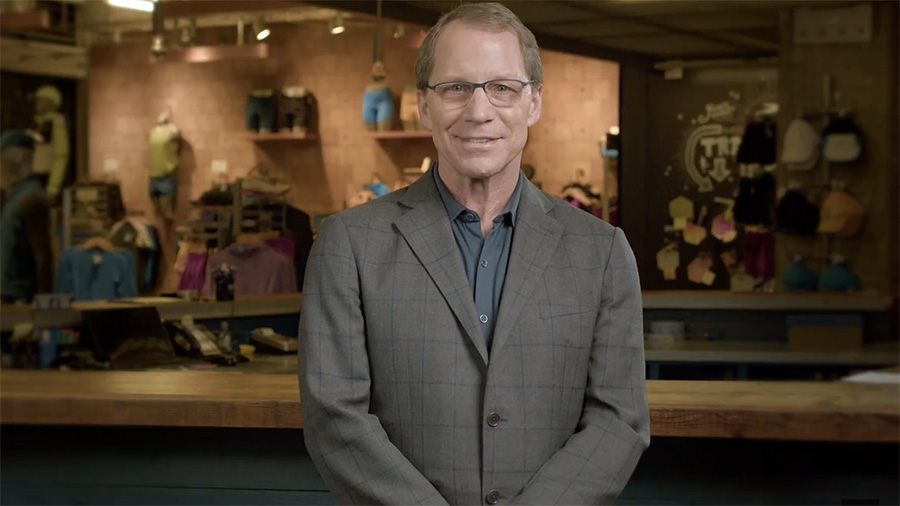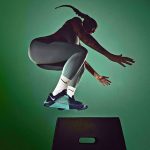At a keynote session held during Switchback Spring, which took place from June 16-18 at the Gaylord Opryland Resort & Convention Center in Nashville, Tennessee, Jim Weber, former CEO of Brooks Running, listed focus, curiosity and trust as his “winning” trifecta formula for leadership success.
“I’m just such a believer in focus,” said Weber, who stepped down as CEO last year after rescuing Brooks from the verge of bankruptcy in 2001 and guiding it to become a leading brand in the run channel. “I’ve had success with focus. I’ve also had failure with kind of trying to do everything. So, I’m a big believer in focus.”
Weber remarked that he was “always kind of passionate and excited about things” in his younger years in a career that also included stops at Sims Sports, The Coleman Co., The Pillsbury Co., and Piper Jaffray; however, he increasingly recognized that managing was “about leading people” and the importance of execution.
He noted that a former mentor once told him, “Vision is great. Strategy is great, but vision without execution is hallucination.”
When he took over leadership of Brooks at the age of 40, after running three other businesses, he put a quote from former British Prime Minister Benjamin Disraeli — “The secret to success is constancy of purpose” — prominently on his computer to remind him to focus on achieving his goals. Said Weber, “I just believe that. That’s been on the whiteboard on my computer for 25 years, and that drove me at Brooks.”
Weber also said he has increasingly valued the importance of curiosity for leaders over the years, based on his conversations with Warren Buffett and the late Charlie Munger, the two former legendary leaders of Berkshire Hathaway, the parent company of Brooks.
“I think the smartest people I’ve met to this day are people that are just constantly learning and open-minded to new things,” said Weber. “People talk about humble leadership, and I never liked the word ‘humble.’ But what it does reflect is the fact that you don’t know everything and that you’re curious. If you know everything, are you really listening to other people?”
Weber, however, particularly emphasized the importance of establishing trust in leadership.
“I think there’s such a deficit of trust in every area of our culture,” said Weber. “There’s trust in government, trust in institutions, trust in leaders, trust in companies, trust in culture… There’s just such a degradation of trust. And I just think it’s foundational to the brand we built at Brooks, but it’s also just foundational to a good team.”
Weber further believes trust is the backbone to building authenticity.
“What does it mean to be authentic? You have to earn that,” said Weber. “You can’t have a strategy to be authentic. And this is where you know it’s not about what you say, it’s about what you do. It’s about your behavior. So, I just think being a trustable leader is an opportunity. Being a trustable brand is an opportunity. And I think that with so much cynicism out there in so many areas, developing behaviors that are trustable is just foundational.”
His conversation with Melanie Strong, a former Nike executive and co-founder of the venture capital firm, Next Ventures, which focuses on early-stage investments across health and wellness companies, explored many themes involving trust, including Weber’s move soon after becoming CEO to narrow Brooks’ focus to the running category. Weber said the company’s shift came after the brand found that running, led by the Beast and the Addiction models at the time, was the only category not losing money. Weber said, “That focus was bold, but it’s not like we had a lot of options.”
He was encouraged by the finding that frequent runners purchase, on average, 2.6 pairs of running shoes a year. Weber said, “We can sell the one shoe, but if we can solve fit, feel and ride, we can earn their second pair, and then you start to move it forward.”
He said Brooks slowly gained traction in run as “product got better every year,” but the decision to focus solely on the running consumer also helped guide the brand’s distribution strategy, and Brooks became obsessed with winning at run specialty. Weber said, “We’re so lucky in run because we had a specialty community — track and field folks, sports medicine, local races, 5Ks…. The running lifestyle is so local, and the specialty community is so dialed into that. So, if it’s about running and runners, you have to be at specialty.”
Weber said running specialty stores “play as editors of the best product in the industry,” and Brooks fixated on solving fit to ensure one of the brand’s models was among the two or three an associate would carry out for the customer to try on. “Our job was basically to make sure the product was going to satisfy the customer because they don’t want to send anybody out who is not happy,” he added.
With the focus on delivering a consistent fit, Weber said the Brooks design team shifted its focus to “building gear to run in” rather than just developing shoes.
“I think that mindset is where our credibility comes from – and authenticity,” he continued. “I think the promises inherent in that are really important to consistently execute on and get credit for and be trusted for.”
Weber noted that Brooks’ climb to become the leading brand in run has not been linear, with the 2008/09 financial crisis, the arrival of the Millennial runner, the barefoot movement, the pandemic, and a “botched” distribution center move all disrupting his career.
He particularly called out a shift in footwear trends around 2015 toward “$80 tech, light, good enough products” that led to a sharp downturn in premium running products. “It was existential for us. Our profits were way down. One of my board members said, ‘Gee, Jim, maybe you should retire?’ So, we had to solve it. And that one was really tough because the consumer had changed,” Weber noted.
He said Brooks “made some bets that performance is timeless” and runners would ultimately return to premium performance product.
“We doubled down on performance and technology and everything,” said Weber. “We refreshed our entire product line and, unbeknownst to everyone, On had been coming up for several years, and Hoka had been coming up for several years. So, we hit 2017 with brand new, fresh products, and over the last six years, pretty much most of the growth in performance run has been Hoka, Brooks and On. And now it’s the ‘it’ category; it was the ‘out’ category.”
He also discussed his recent battle to overcome cancer, which has given him a new appreciation of business challenges and life.
“You know what my favorite ad in running of all time is? ‘There is No Finish Line,'” Weber pondered. “It’s a Nike ad, right? And runner got that because it reflects the fact that it isn’t really about the finish line in life – it’s about the journey.”
Image courtesy Brooks Running/Jim Weber
















